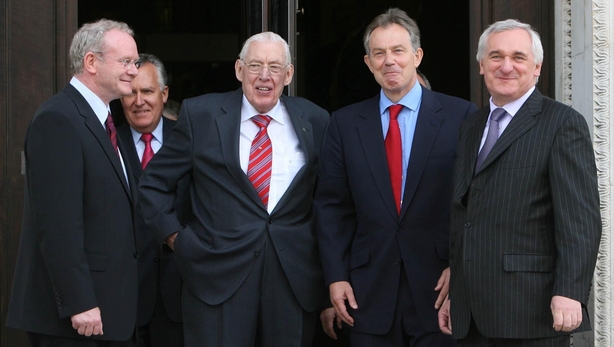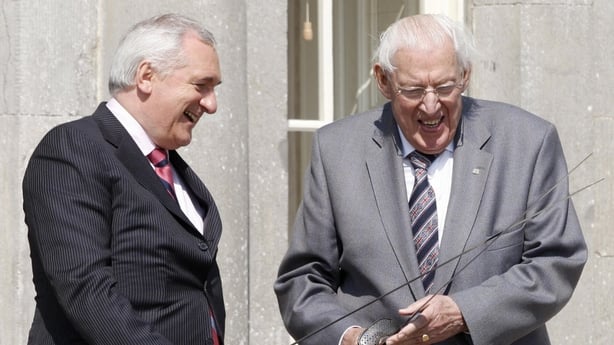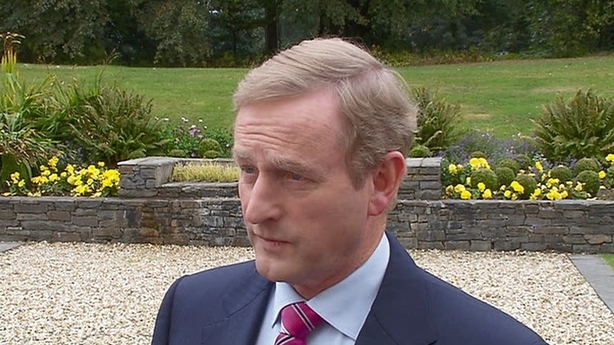Northern Ireland Deputy First Minister, Sinn Féin's Martin McGuinness, has reacted to the death of Ian Paisley saying he has "lost a friend".
In a message on Twitter he said: "Very sad to learn that Ian Paisley has died. My deepest sympathy to his wife Eileen & family. Once political opponents - I have lost a friend."
Very sad to learn that Ian Paisley has died.My deepest sympathy to his wife Eileen & family.Once political opponents - I have lost a friend.
— Martin McGuinness (@M_McGuinness_SF) September 12, 2014Earlier, in a statement, he said: "Over a number of decades we were political opponents and held very different views on many, many issues but the one thing we were absolutely united on was the principle that our people were better able to govern themselves than any British government.
"I want to pay tribute to and comment on the work he did in the latter days of his political life in building agreement and leading unionism into a new accommodation with republicans and nationalists.
"In the brief period that we worked together in the Office of the First and Deputy First Minister I developed a close working relationship with him which developed into a friendship, which despite our many differences lasted beyond his term in office.
"I want to send my sincere sympathy to his wife, Eileen, his children and extended family."
Northern Ireland First Minister Peter Robinson paid tribute to a man he called a "giant in Ulster politics".
Mr Robinson said Mr Paisley had been a man of conviction, and hat he had entered into power-sharing when the time was right.
Earlier Mr Robinson said: "I consider that he made a massive contribution to the process in which we are presently engaged. I think that everybody recognised that he had a personality which we're hardly likely ever to see again in Northern Ireland.
"Even those who thought the least of his politics, thought the most of him as a person".
Sinn Féin Leader Gerry Adams expressed deep shock and sadness at the death of Mr Paisley.
Mr Adams said: "I am shocked and saddened to learn of the death of Dr Ian Paisley.
"There will be plenty of time for political analysis but at this point I wish to extend my deepest sympathies to Ian's wife Eileen and to the Paisley family at this very sad time."
The passing of Ian Paisley - the end of an era. A time for sympathies for his family and loved ones. A time to focus on peace in the North
— Mary Lou McDonald (@MaryLouMcDonald) September 12, 2014President Michael D Higgins said he had "heard with sadness" of Mr Paisley.
"On behalf of Sabina and myself, I would like to express to his wife Eileen and to his family our deepest sympathy," Mr Higgins said.
"Dr Ian Paisley was a man of deep convictions. Irrespective of one's political perspective, Dr Paisley was undoubtedly a man of immense influence on the contemporary history of this island.
"His early career was characterised by an uncompromising position of a constitutional kind. However, his embracing of the change necessary to achieve a discourse that might lead to peace was of immense significance, as was his commitment to building relationships in support of that peace.
"Having sent a representative to my Inauguration, Sabina and I were happy to welcome him and Eileen to Áras an Uachtaráin, where he showed great interest in the history of the institution and the building. I also had the opportunity to speak with Dr Paisley at his last public engagement in City Hall, Belfast in November of last year.”
Former taoiseach Bertie Ahern has also paid tribute to Mr Paisley.
He said: "Ian Paisley was a big man with a big heart and he was a good friend. He was a valued partner in peace and a charismatic politician who I grew to admire greatly.
"We both came from very different political traditions, but the more I got to know Ian Paisley, the more I respected him and the more I came to like him.

"In my dealings with him, I found him to be unfailingly polite and a man of his word.
"I will never forget his warmth and his sincerity that day he first shook my hand in Farmleigh on a glorious spring day in 2007.
"He had a warm personality, he was witty, he had a keen sense of humour and a booming laugh. This helped to build relationships from the start.
"I remember at our first ever meeting, which was a breakfast summit in the Irish Embassy in London, he ordered a hard-boiled egg. He then proceeded to tell me, with a twinkle in his eye, that this was to be sure I couldn't poison him!
"It was his way of breaking down barriers."
The Moderator of the General Assembly of the Presbyterian Church in Ireland, the Right Rev Dr Michael Barry said Mr Paisley had "served the people of Northern Ireland in many capacities over the course of his long political career and will be warmly remembered particularly for the historic leadership he gave on assuming the office of First Minister."

Former president Mary McAleese offered her "sincerest sympathies" to Mr Paisley’s wife Baroness Eileen Paisley, their children, Rhonda, Sharon, Cherith, Kyle, Ian Jr and their grandchildren.
"Dr Paisley will be remembered by many people in Northern Ireland as a controversial figure, a political giant and spiritual leader. In more recent years when he felt the time was right he became an influential man of peace," Mrs McAleese said.
"His support for peace, reconciliation and power sharing offered with characteristic commitment and conviction forms an important part of his considerable legacy.
"We have very fond memories of our meetings with Lord Bannside and his wife Baroness Eileen Paisley in recent years, especially when they visited Áras an Uachtaráin in 2011."
Former president Mary Robinson described Mr Paisley as "a man of strong views and convictions which often proved divisive, but also a man who showed he was prepared to take risks for peace and to lead, sometimes in very difficult circumstances.
"Life experiences helped him to realise that peace was worth it. The same qualities are still needed today in Northern Ireland and in many other places around the world. I extend my sympathies to his wife, family and community."
Former British prime minister Tony Blair said: "Ian was a man of deep convictions. The convictions never changed. But his appreciation of the possibilities of peace, gradually and with much soul searching, did. He began as the militant. He ended as the peacemaker.
"Over time I got to know him well. He could be an uncompromising even intransigent opponent. But he was also someone who loved Northern Ireland and its people. He led them but he also followed them. When they said to him peace was thinkable, he made it possible.
"His religious beliefs were profound and genuine. He talked to me often about the need for forgiveness and I am sure part of what made him finally take the road to peace, was his capacity, driven by his Christian belief, to contemplate and then work for reconciliation.
"I don't suppose 40 years ago he would ever have thought that politically his life then would end as it does now. But I know he and Eileen would be very proud of his huge contribution to a peaceful future for Northern Ireland."
Mr Blair’s predecessor John Major voiced his "great admiration and respect" for Mr Paisley, who was a fierce opponent of the Downing Street Declaration in 1993.
He said: "Ian Paisley was a man of public passion and huge personal charm, who cared deeply for the community he served.
"From a position where he was suspicious of every movement towards peace, he came to embrace it, and served as the first First Minister of Northern Ireland. It was a remarkable journey by a remarkable man, for whom I had great admiration and respect."
British Prime Minister David Cameron said Mr Paisley was a controversial figure for large parts of his career.
"Yet the contribution he made in his later years to political stability in Northern Ireland was huge," Mr Cameron added.
"In particular, his decision to take his party into government with Sinn Fein in 2007 required great courage and leadership, for which everyone in these islands should be grateful."
DUP MP Jeffrey Donaldson said there was a lot of truth in the observation that he was the only one who could have brought Unionists to a deal with nationalists.
Speaking on RTÉ's News at One, Mr Donaldson said Mr Paisley was appreciated by his party and the Unionist community.
He said: "We recognised very clearly the major contribution he made to bringing Northern Ireland to where it is today.
"In fact, there are many people alive today who might otherwise not be if it wasn't for him and others giving the leadership that was required at such a critical time."

Mr Paisley's death marks the end of an era, his former political opponent John Hume has said.
But Mr Hume has recalled him as a man who was capable of great charm and remembered how, despite their differences, the pair worked together on economic issues.
He said Mr Paisley had eventually embraced the politics of compromise, but he questioned if history might ask why he did not do it sooner.
He said: "I knew Ian Paisley well throughout our many years in politics and we enjoyed a close working relationship in the European Parliament.
"During this time, Mr Paisley was a larger than life character in Irish politics and a dominant voice within unionism.
"While he was not always constructive, and often politically challenging, he could, on a personal level, be very charming.
"His over-stated outbursts often overshadowed the understated constituency work he carried out for all the people of North Antrim whom he represented as an MP and MLA, and the tireless efforts he made on behalf of Northern Ireland as a member of the European Parliament."
The former leader of the SDLP added: "However history will record his political career as a journey - one which took him from the politics of division to a place where he accepted agreement as a solution, the need for power-sharing, and respect for diversity.
"But history will also ask if he should have reached this point sooner."
Former civil rights leader Austin Currie said that he had once called Mr Paisley a "bigoted hangover from the 17th century" but that he had had to revise this view, given the former first minister’s conversion to power-sharing "and his remarkable 'chuckle brother' relationship with Martin McGuinness".
However, Mr Currie said what was not in doubt was Mr Paisley's "major contribution for most of his political career to instability and violence in Northern Ireland and his share of responsibility for the intensity and duration of the troubles which claimed almost 4,000 lives".
Former Leader of the Alliance Party of Northern Ireland John Cushnahan has said that he was shocked at what he called the revision of history that had taken place among analysts and politicians.
Mr Cushnahan said Ian Paisley would be remembered for "prolonging the conflict".
"Today we are analysing the political record of a major, major figure in Northern Ireland politics, and not only in Northern Ireland, but on the island of Ireland and we should be objective in analysing his contribution, not sentimental just because he died, not influenced by the one good act he made at the end.
"My view is that his record in Northern Ireland is a very negative one," Mr Cushnahan said. "It increased violence, it increased sectarianism and prevented peace coming much earlier, and I don't think we should forget that, nor should we forgive it, either."

Taoiseach pays tribute to 'major figure'
Taoiseach Enda Kenny has said Mr Paisley was a "major figure in the history of these islands".
Mr Kenny said: "I know that he treasured the peace and friendship that he had lived to see, and helped to build, between our traditions.
"His devotion to his faith and to the Unionist people of Northern Ireland was deep and unshakeable.
"In time, history will come to a fuller judgement of his long career. And, while he was of course a divisive figure, his greatest legacy will be one of peace."
Minister for Foreign Affairs Charlie Flanagan described Mr Paisley as a "man of strong principles".
Mr Flanagan said: "He was admired by many for his resolute spirit and his strength of purpose."
Statement by Minister @CharlieFlanagan on the death of Dr Ian Paisley. pic.twitter.com/tinGNX75jA
— IrishForeignMinistry (@dfatirl) September 12, 2014Chairperson of the Committee on the Implementation of the Good Friday Agreement, Frank Feighan paid tribute to Mr Paisley.
"Dr Paisley played an important and prominent role in the modern history of Ireland, North and South, and in creating the peace that all citizens currently enjoy," Mr Feighan said.
"As a hard working parliamentarian, he fostered cross border relations and shared ideas which informed debate on areas of mutual interest.”
Fianna Fáil leader Micheál Martin said: "The journey he travelled, in many ways, encapsulates the triumph of the peace process and constitutional politics, and the futility of so much of what came before."
Former British Secretary of State for Northern Ireland Peter Hain said Mr Paisley was the "big man" of Northern Ireland politics.
Mr Hain told the BBC the Good Friday Agreement could not have been achieved without him.
He said: "It brought old enemies together and that was something that only Ian Paisley could have delivered from a Unionist side, having always said no in the past.
"Over many decades, he came to realise that this was the moment to say yes."
Former Taoiseach John Bruton said Mr Paisley had a great sense of humour, which took the hard edge off some of the controversial things he said.
He said: "He was a very, very friendly person. When I met him I felt there was a genuine good feeling between himself and ... Martin McGuinness at that time. I saw it in the United Stated when they visited together."

